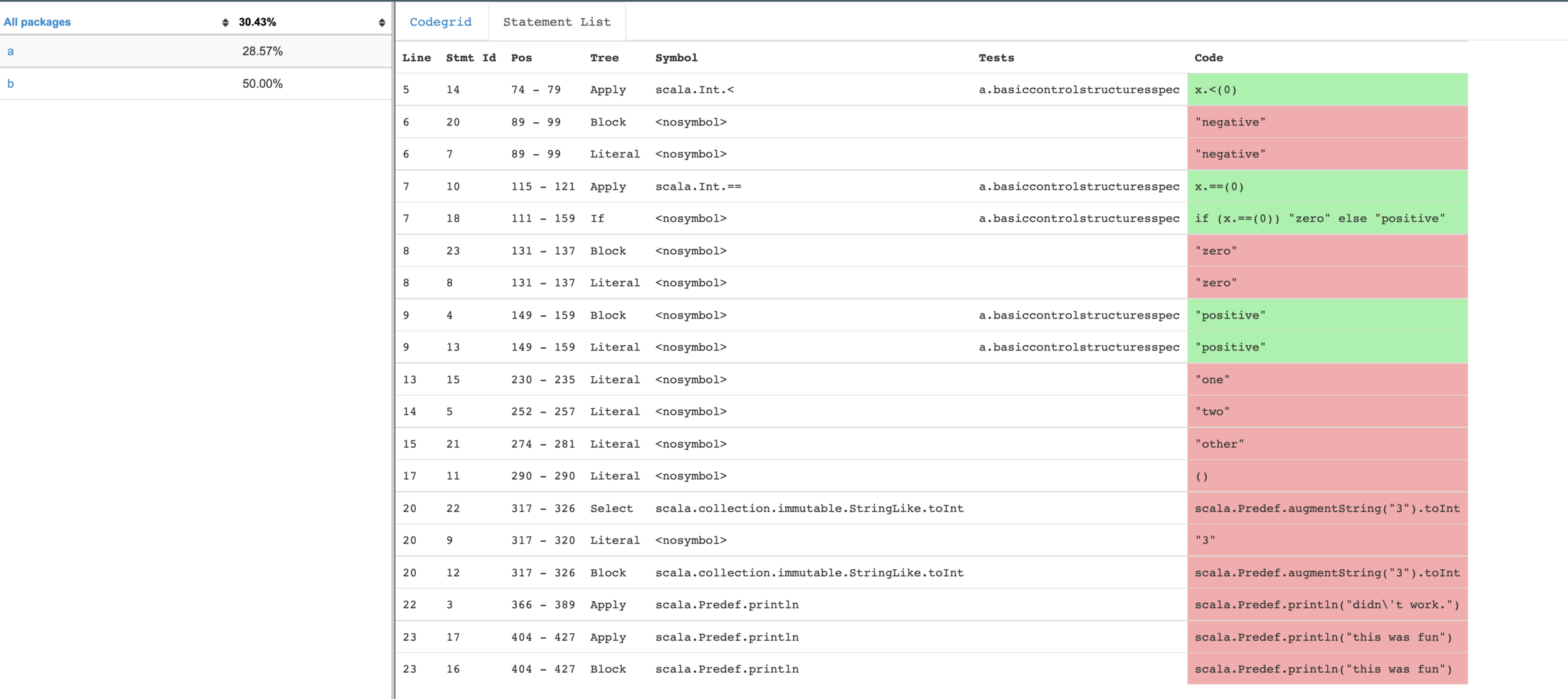Code Coverage in Scala 3
ScalaCon 2021
Chris Kipp
@ckipp01




A little about me
- Switched careers into programming
- I enjoy simple tech
- Big Neovim fan
- You'll find me working in Scala Tooling
- Host the Tooling Talks Podcast
- Software engineer at Lunatech
- chris-kipp.io/talks
scoverage
- Code coverage tool for Scala
- Started in 2010 by Mikko Koponen
- Then maintained by Stephen Samuel and Grzegorz Slowikowski for years
- Over 1.5 million dowloads a month
- sbt, Mill, Gradle, and Maven


How do you fit into the picture, Chris?

I write Scala, and needed code coverage...
So I decided to adopt it.

How does it even work?

Compiler plugin (in Scala 2)

Compiler plugin (in Scala 2)
sbt:scoverage-test> show Compile / compile / scalacOptions
[info] Compile / compile / scalacOptions
[info] List(
[info] -Xplugin:/my/path/to-plugin/2.0.0-M4/scalac-scoverage-plugin_2.13.6-2.0.0-M4.jar,
[info] -P:scoverage:dataDir:/path-to-my-project/target/scala-2.13/scoverage-data,
[info] -P:scoverage:sourceRoot:/path-to-my-project/scoverage-test,
[info] -P:scoverage:reportTestName
[info] )
Ok, so what does it do
def isTwo(num: Int): Boolean =
if (num == 2) {
true
} else {
false
}
We'll illustrate with a very simple piece of code

Compiler plugin (Scala 2)
case i: If =>
treeCopy.If(
i,
process(i.cond),
instrument(process(i.thenp), i.thenp, branch = true),
instrument(process(i.elsep), i.elsep, branch = true)
)
The tree would be instrumented here

def isTwo(num: Int): Boolean = if ({
scoverage.Invoker.invoked(
1,
"/var/folders/fq/nx_jsnyd6550xp03czx898d40000gn/T/",
scoverage.Invoker.invoked$default$3()
);
num.==(2)
}) {
scoverage.Invoker.invoked(
3,
"/var/folders/fq/nx_jsnyd6550xp03czx898d40000gn/T/",
scoverage.Invoker.invoked$default$3()
);
{
scoverage.Invoker.invoked(
2,
"/var/folders/fq/nx_jsnyd6550xp03czx898d40000gn/T/",
scoverage.Invoker.invoked$default$3()
);
true
}
} else {
scoverage.Invoker.invoked(
5,
"/var/folders/fq/nx_jsnyd6550xp03czx898d40000gn/T/",
scoverage.Invoker.invoked$default$3()
);
{
scoverage.Invoker.invoked(
4,
"/var/folders/fq/nx_jsnyd6550xp03czx898d40000gn/T/",
scoverage.Invoker.invoked$default$3()
);
false
}
};

scoverage.coverage
1 <-- id
a/src/main/scala/mypackage/BasicControlStructures.scala <-- source path
a <-- package name
BasicControlStructures <-- class name
Object <-- class type
a.BasicControlStructures <-- full class name
isTwo <-- method name
74 <-- start offset
79 <-- end offset
5 <-- line number
scala.Int.== <-- symbol name
Apply <-- tree name
false <-- is branch
0 <-- invocations count
false <-- is ignored
num.==(2) <-- sign/a/target/scala-2.13/scoverage-data

What's the Invoker?
- Writes the ids that call out to it
- Keeps track of how many times they are called
- Adds the test name where it was triggered

scoverage.measurements
1 a.basiccontrolstructuresspec
9 a.basiccontrolstructuresspec
4 a.basiccontrolstructuresspec
8 a.basiccontrolstructuresspec
7 a.basiccontrolstructuresspeca/target/scala-2.13/scoverage-data

Reports


Reports

Scala 3 coverage

You just explained it all, why not cross publish it and call it a day?

-
New compiler new rules
-
6 week release cycles are hard
lazy val bin212 =
Seq(
defaultScala212,
"2.12.14",
"2.12.13",
"2.12.12",
"2.12.11",
"2.12.10",
"2.12.9",
"2.12.8"
)
lazy val bin213 =
Seq(
defaultScala213,
"2.13.6",
"2.13.5",
"2.13.4",
"2.13.3",
"2.13.2",
"2.13.1",
"2.13.0"
)
Put it IN the compiler
-
No need to release every 6 weeks
-
Easily catch regressions
-
Have a friendly group of compiler devs looking it over
-
Plus Quentin Jaquier already has a working POC from like 4 years ago.
-
https://github.com/Qjaquier/dotty-coverage-tools
-

So let's do this
Again, Quentin's work on this and the report he wrote is incredibly useful. Most of these examples come straight from Code coverage for Dotty.
http://guillaume.martres.me/code_coverage.pdf

Where do we put this?
❯ scala3-compiler -Xshow-phases
parser
typer
inlinedPositions
sbt-deps
extractSemanticDB
posttyper
prepjsinterop
sbt-api
SetRootTree
pickler
inlining
postInlining
staging
pickleQuotes
{firstTransform, checkReentrant, elimPackagePrefixes, cookComments, checkStatic, betaReduce, inlineVals, expandSAMs}
initChecker
{elimRepeated, protectedAccessors, extmethods, uncacheGivenAliases, byNameClosures, hoistSuperArgs, specializeApplyMethods, refchecks, tryCatchPatterns, patternMatcher}
{elimOpaque, explicitJSClasses, explicitOuter, explicitSelf, elimByName, stringInterpolatorOpt}
{pruneErasedDefs, uninitializedDefs, inlinePatterns, vcInlineMethods, seqLiterals, intercepted, getters, specializeFunctions, liftTry, collectNullableFields, elimOuterSelect, resolveSuper, functionXXLForwarders, paramForwarding, genericTuples, letOverApply, arrayConstructors}
erasure
{elimErasedValueType, pureStats, vcElideAllocations, arrayApply, addLocalJSFakeNews, elimPolyFunction, tailrec, completeJavaEnums, mixin, lazyVals, memoize, nonLocalReturns, capturedVars}
{constructors, instrumentation}
{lambdaLift, elimStaticThis, countOuterAccesses}
{dropOuterAccessors, checkNoSuperThis, flatten, renameLifted, transformWildcards, moveStatic, expandPrivate, restoreScopes, selectStatic, junitBootstrappers, Collect entry points, collectSuperCalls, repeatableAnnotations}
genSJSIR
genBCode
Where do we put this?
❯ scala3-compiler -Xshow-phases
...
SetRootTree
+ coverage
pickler
inlining
...- At the end of the front end phases
- It's important to do this before things like dead code elimination or other optimizations that would remove or change code we want to instument

Different types of tree instrumentation

Fully Instrumented
These are things that can be fully instrumented as they are.
case tree: Literal => instrument(tree)
case tree: New => instrument(tree)
case tree: This => instrument(tree)
case tree: Super => instrument(tree)
case Select(qual, _) if (qual.symbol.exists && qual.symbol.is(JavaDefined)) =>
case tree: Select =>
if (tree.qualifier.isInstanceOf[New]) {
instrument(tree)
} else {
...
}
Not Instrumented
These are things that either their syntax don't allow it or they code may be removed during compilation
case tree: Import => tree
case tree: Ident if (isWildcardArg(tree)) => tree

Partially Instrumented
Cases where we don't want to instrument the entire tree
def instrumentCaseDef(tree: CaseDef)(using Context): CaseDef = {
cpy.CaseDef(tree)(tree.pat, transform(tree.guard), transform(tree.body))
}
Some special considerations
object Main {
def ourFunction(a: Int, b: Int, c: Int) = ???
}
Main.ourFunction(1, thisThrows(2), someOtherComputation())Main.ourFunction(1, thisThrows(2), someOtherComputation())

Argument lifting
val x0 = Main
val x1 = 1
val x2 = thisThrows(2)
val x3 = someOtherComputation()
x0.ourFunction(x1, x2, x3)Main.ourFunction(1, thisThrows(2), someOtherComputation())
Reusing some of the same logic from ETA expansion

But... be careful where you apply this
val x0 = doThing()
true || x0This would show x0 as covered, when it shouldn't be
What can we re-use from scoverage?


Scala 2
Compiler Plugin
Invoker

Scala 2
Compiler Plugin
Domain
Serializer
Reporter

Scala 2
Compiler Plugin
Domain
(de)Serializer
Reporter
Scala 3
In the Compiler
Invoker
Invoker
2.12, 2,13, 3

Scala Code Coverage
Unshared
- Instrumenting your code
- The invoker
Shared
- Deserializing
- Aggregation
- Reporting
Demo

How to help

- Test this out
- https://github.com/lampepfl/dotty/pull/13880
- https://github.com/ckipp01/scala3-example-project
- Help out with maintenance
- Mill contrib module
- sbt-scoverage plugin
- Abandoned Maven plugin
- gradle-scoverage
- Abandoned examples repo